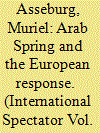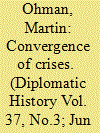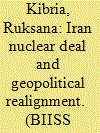|
|
|
Sort Order |
|
|
|
Items / Page
|
|
|
|
|
|
|
| Srl | Item |
| 1 |
ID:
120781


|
|
|
|
|
| Publication |
2013.
|
| Summary/Abstract |
Europeans enthusiastically embraced the Arab Spring. However, the EU and its member states have lacked significant influence in a neighbouring region in turmoil. The EU has not devised new and more appropriate approaches towards the region, but rather relied on its traditional tools and frameworks. The Eurozone's financial crisis and threat perceptions have quickly underminded the readiness of EU member states to contribute meaningfully to Arab transformations with money, market access and mobility. In addition, European support has not been equally welcomed across the region, and delays in terms of building empowered governments have prevented a quick impact. Moreover, the violent power struggles triggered by the Arab Spring have revealed the EU's weakness with regard to effective conflict prevention and timely crisis management - and thus created an environment averse to democratic transformation and regional stabilisation.
|
|
|
|
|
|
|
|
|
|
|
|
|
|
|
|
| 2 |
ID:
129534


|
|
|
|
|
| Publication |
2014.
|
| Summary/Abstract |
There is clear recognition in both Moscow and Tokyo that a Sino-centric continent is not in their interests. Russia and Japan are obliged to recalculate their strategies in order to adapt for a future geopolitical realignment in Asia. Both sides recognize the stakes and that the rules of the game are no longer static.
Amid debate about a renaissance of U.S. power in Asia, Russian President Vladimir Putin has been thinking about his own "pivot" or "rebalance" to the Far East. Russia has always maintained its historical legacy as a Pacific power, but realistically this has largely been ignored for decades. Japan meanwhile has been challenged vigorously this past year by China, and to a less extent, South Korea and Russia, on its territorial disputes. This, coupled with China's increased assertiveness on security policy in the region, has created an environment with new challenges that Japan, the U.S. and Russia must confront. Japan and Russia especially are facing an uncertain future as Asia continues to morph into the most strategically important region in the world.
|
|
|
|
|
|
|
|
|
|
|
|
|
|
|
|
| 3 |
ID:
123841


|
|
|
|
|
| Publication |
2013.
|
| Summary/Abstract |
This article argues that the Missouri Crisis 1819-1821 was a consequence of growing concerns about geopolitical realignments in the post-Napoleonic world and the impending international recession. Scholars have typically explained the conflict over slavery's expansion as the last convulsion of the first-party system, a reflection of budding humanitarian considerations, or as a product of the growing contradictions between slavery and freedom in an era of an emerging liberal capitalist ethos and a democratization of American politics. The central element of the northern restrictionist position, however, was that slavery's expansion into the western territories would seriously impede the United States' ability to compete economically and mobilize militarily in times of war. In light of persistent tensions with foreign powers, the perceived risk of renewed great power warfare, international markets glutted, and every branch of the economy paralyzed, restrictionists saw the halting slavery's expansion as a necessary measure to save the federal republic.
|
|
|
|
|
|
|
|
|
|
|
|
|
|
|
|
| 4 |
ID:
133523


|
|
|
|
|
| Publication |
2014.
|
| Summary/Abstract |
The November 2013 interim nuclear deal that was signed between the P5+1 and Iran is an epochal event, though, given the volatile situation, it may be too early to make a correct prognosis of its ramifications. For one thing, the nuclear deal could complicate the regional security environment by exacerbating Saudi-Iranian tension, though as such, it is not the source. Regardless of Saudi displeasure at the conclusion of the accord, Iran's ascendancy is amply clear, with its ambiguous nuclear status playing a strategic role. While the dominant narrative currently is the centrality of Shia-Sunni regional tension represented by Iran and Saudi Arabia, reality is far more intricate and multi-dimensional, requiring a more nuanced appreciation of their relationship, which suggests that, for the foreseeable future it would be in the US interest to have Saudi Arabia, off-setting Iran, but from a much weaker position, in a replay of the game of balance of power achieved through sustained geopolitical manipulation, and a smaller American foot-print. The goal of Tehran's nuclear brinksmanship is essentially ensuring its regional primacy, which accords with US interests, too. While the recent interim Iran deal apparently concerns the nuclear issue, it has far-reaching implications for the global energy market, which the relaxation of economic sanctions and the integration of Iran as a legitimate member of the international community is certain to affect. US-Iran normalisation of relations is quietly enhancing China's role, both economic and military, in the Gulf region, whose energy resources for the foreseeable future would continue to remain crucial for Beijing. More than a reconciliation between Washington and Tehran, the essence of a real paradigm shift would involve a Saudi-Iranian accommodation, and de facto Saudi acceptance of Iran's regional pre-eminence.
|
|
|
|
|
|
|
|
|
|
|
|
|
|
|
|
|
|
|
|
|